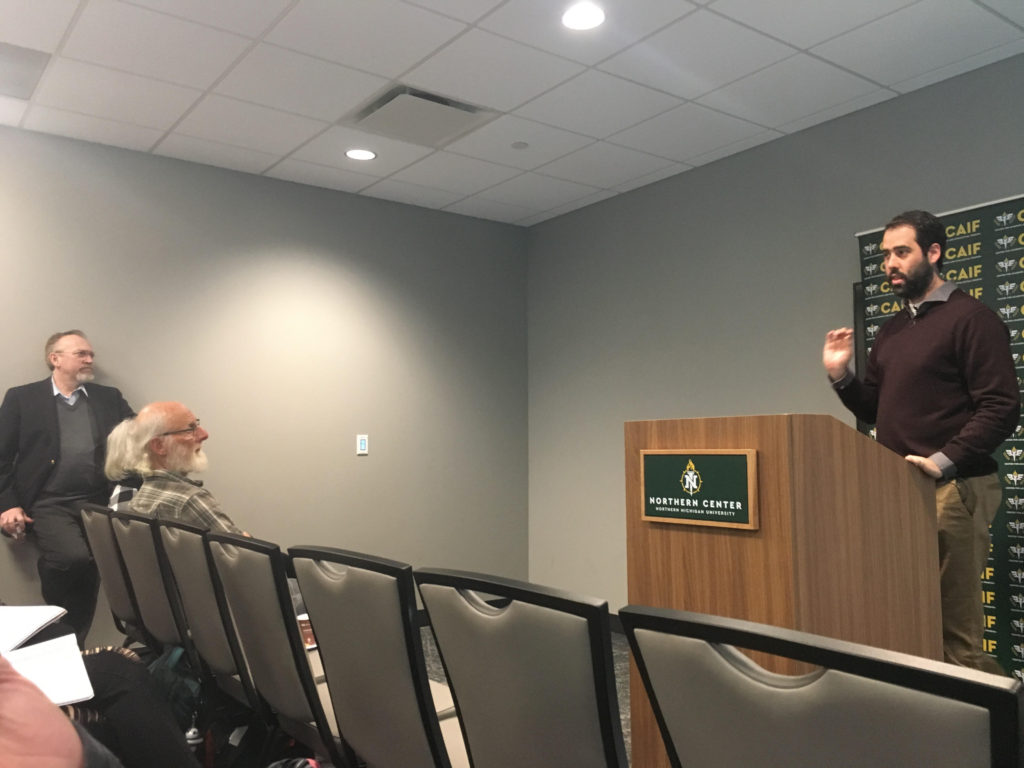On Monday Feb. 24, the Center for Academic and Intellectual Freedom (CAIF) hosted a lecture by Israeli Journalist and Researcher Gilad Halper on the topic of “The Role of Media in Democratic Decline.” Halper examined the struggles faced by modern news outlets, the harmful effects brought about by the dispersal of untruthful reporting and promoted the ideas of philanthropy-funded reporting, as well as a policing body to ensure the accuracy of information dispersed in the media.
The talk was cosponsored by the Scholars for Peace in the Middle East and was part of the CAIF’s Showman Lecture Series.
Halper’s half-hour lecture prompted a lengthy period of questions and answers from the audience, which was composed of a large portion of community members as well as a mixture of students, many of whom came as part of a class by Brahm.
Halper stressed his understanding that, along with being a watchdog, the media is primarily a commericial endeavor and responds to the desires of the masses, acting in sync with the sensibilities of its consuming public. In this way, he said, journalists are the opposites of judges, as they are internal and external to the democratic system. Given this fact, Halper said he found that media’s decline is critical when considering its function in democracy.
“This is exacerbated by the debilitating financial crisis that the media industry has been undergoing for the last few decades, with really no end in sight. What allowed the media to fulfil its democratic role more or less successfully, was the fact that it was a very profitable industry,” Halper said.
He outlined the various factors contributing to the decline in quality media coverage and asserted that the economic model newpapers used historically “all but collapsed” around the world, with $50 billion lost in America in the 2000’s and similar crises in other parts of the world.
Community member and Physician Aaron Scholnik attended the talk and responded to Halper’s analysis with his own take on the topic of media quality control.
“It seems to me that in a free system, that newspapers or individual journalists are going to be looking at their lifeguard’s back,” Scholnik said. “When [journalists] say something that they disagree with, something that is not factual, they would point it out so that you have a competition between journalists in the same paper or between papers.”
Other audience members brought up the responsibility of readership to fulfill Halper’s suggested role of a regulatory body.
Halper stressed that with the increasing share of opinion content in news media, he believed the industry would be benefitted by new methods of funding, primarily through philanthropists, and a new regulatory body to ensure that journalists maintain a code of ethics and present information responsibly, to combat the “certain dimension of shadiness” necessary for the current practices of journalism.
“Dwindling of resources leads to the hiring of worse-paid and therefore less-experienced and less-qualified staff having to sustain a much heavier workload and being prevented the crucial skill of specialization,” Halper said.
He mentioned that 40 years ago, journalists often kept a beat, a specialization, and knew everything about it so that they could explain its processes effectively to the public. However, today, Halper said, younger journalists are forced to take on as many as three or four beats with a “much more strenuous news cycle.”
Halper is a broadcaster, journalist and media historian. He is currently a co-host of the “Tel Aviv Review,” a founding co-editor of the “Tel Aviv Review of Books” magazine as well as a fellow at University of Haifa.
“Gilad is a dear friend, so I’m glad to have him here, to show him this beautiful new building and show him around our beatiful town,” director of the CAIF and English Professor Gabiel Brahm said.




























